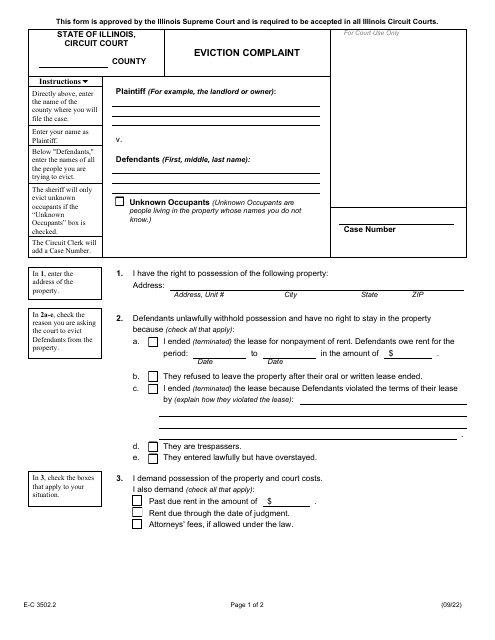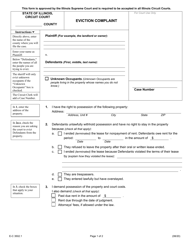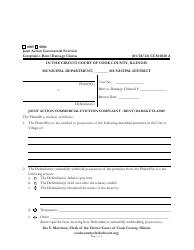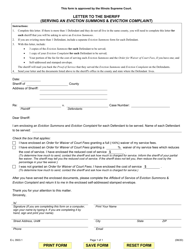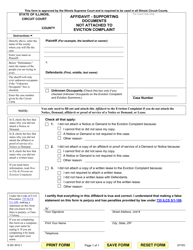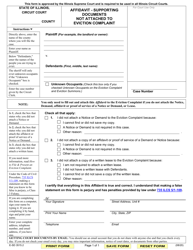Form E-C3502.2 Eviction Complaint - Illinois
What Is Form E-C3502.2?
This is a legal form that was released by the Illinois Circuit Court - a government authority operating within Illinois. As of today, no separate filing guidelines for the form are provided by the issuing department.
FAQ
Q: What is Form E-C3502.2?
A: Form E-C3502.2 is an Eviction Complaint used in Illinois.
Q: What is an Eviction Complaint?
A: An Eviction Complaint is a legal document filed by a landlord to start eviction proceedings against a tenant.
Q: Who uses Form E-C3502.2?
A: Form E-C3502.2 is used by landlords in Illinois to file an eviction complaint.
Q: What information is required in Form E-C3502.2?
A: Form E-C3502.2 requires information about the landlord, tenant, rental property, lease agreement, and the reason for eviction.
Q: What should I do if I receive an Eviction Complaint?
A: If you receive an Eviction Complaint, it is important to read it carefully and respond within the specified time frame to avoid a default judgment.
Q: What are the possible outcomes of an eviction proceeding?
A: The possible outcomes of an eviction proceeding include eviction, payment of past due rent, or negotiation of a new lease agreement.
Q: Can I contest an eviction?
A: Yes, tenants have the right to contest an eviction and present their case in court.
Q: What are the rights of tenants in eviction proceedings?
A: Tenants have the right to receive notice of the eviction, present a defense, and seek legal representation.
Q: Can I be evicted without a court order?
A: No, landlords must obtain a court order to legally evict a tenant.
Q: What happens if I lose an eviction case?
A: If you lose an eviction case, you may be required to move out of the rental property and potentially owe back rent and court fees.
Q: Can I appeal a decision in an eviction case?
A: Yes, tenants have the right to appeal a decision in an eviction case.
Q: Should I consult with an attorney for an eviction case?
A: It is highly recommended to consult with an attorney familiar with landlord-tenant laws to navigate the eviction process.
Q: What are the potential consequences of eviction?
A: Potential consequences of eviction include difficulty finding future housing, damage to credit score, and potential legal action for unpaid rent.
Q: How long does the eviction process usually take?
A: The duration of the eviction process can vary, but it typically takes several weeks to a few months.
Q: Can a landlord evict a tenant for any reason?
A: No, landlords can only evict tenants for valid reasons specified by state and local laws.
Q: Can a landlord evict a tenant without cause?
A: In some cases, landlords may be able to terminate a lease without cause, but specific laws vary by jurisdiction.
Q: What should I do if I think my eviction is unfair or illegal?
A: If you suspect your eviction is unfair or illegal, you should seek legal advice and explore your rights and options.
Q: How can I avoid eviction?
A: To avoid eviction, tenants should pay rent on time, follow the terms of the lease, maintain the rental property, and address concerns with the landlord promptly.
Q: Can a tenant be evicted during the COVID-19 pandemic?
A: During the COVID-19 pandemic, eviction protections may be in place to prevent certain types of evictions for non-payment of rent.
Q: What is the eviction process in Illinois?
A: The eviction process in Illinois typically involves serving notice, filing an eviction complaint, attending a court hearing, and obtaining a judgment for possession.
Q: Can a tenant be evicted for late rent payments?
A: Yes, landlords can initiate eviction proceedings for late rent payments, although certain protections may be in place during the COVID-19 pandemic.
Q: What happens if a tenant doesn't respond to an eviction complaint?
A: If a tenant fails to respond to an eviction complaint within the specified time frame, the landlord may be awarded a default judgment and proceed with the eviction.
Q: Can a landlord change the locks or remove a tenant's belongings during an eviction?
A: No, landlords are generally not allowed to change locks or remove a tenant's belongings without a court order.
Q: Can a tenant withhold rent if the landlord fails to make necessary repairs?
A: In some cases, tenants may be able to withhold rent if the landlord fails to make necessary repairs, but specific requirements and procedures vary by jurisdiction.
Form Details:
- Released on September 1, 2022;
- The latest edition provided by the Illinois Circuit Court;
- Easy to use and ready to print;
- Quick to customize;
- Compatible with most PDF-viewing applications;
- Fill out the form in our online filing application.
Download a fillable version of Form E-C3502.2 by clicking the link below or browse more documents and templates provided by the Illinois Circuit Court.
